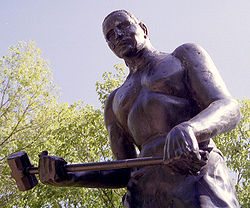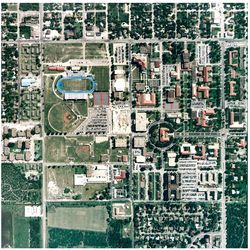Think of this as Volume 15, Number 21 of A-Clue.com, the online newsletter I've written since 1997. Enjoy.

He is usually portrayed as a black man, which makes him unique among early American heroes. The essence of the story is that of a man against a machine, winning and then collapsing and dieing on the spot.
The story was first told in the 1870s, and represented the great economic battle of that time, the same battle fought out on during the Civil War. Southerners used brute labor to get rich on cotton, but the machine age would overwhelm them and make us one nation again, then drive us forward.
What's important to note is that this story has been played out, again-and-again, in every generation since then.
-
Farmers were the John Henry of the 1890s. Their Populist revolt was based on the primacy of production over distribution. Distribution won, an organized economy being created on standardizing the price of economic inputs.
-
Wall Street bankers were the John Henry of the 1930s. The Depression resulted from a shortage of demand, something the market could not fix. Government had to provide that demand and create the middle class before mass consumption could match mass production.
-
Factory workers were the John Henry of the 1970s. Rust Belt workers were replaced by Sun Belt innovations, microchips automating the manufacturing and distribution process, content providing the new economic way forward.

Today's steel pile driver is the computer network, which is replacing middle management, destroying the lives of millions of office workers, up-and-down the line, jobs that won't come back. Productivity is the result of using Customer Relationship Management (CRM) tools to know who you're selling to, Business Process Management (BPM) tools to know who you're buying from, all tied together by broadband Internet resources.
The mix of our workforce is changing. What offices are left are factories, like those occupied by software engineers. Software is one of the few key economic goods we still make by hand. There is no Moore's Law of Software. There are better tools for making it, but you still have to read the code, and you still have to test the code. Once the code is running, maintenance can become minimized, and as each new job gets done by code jobs are displaced. Change accelerates, it's creative destruction, and the accent is on destruction.
Our economic drivers today are our research universities. The work process there is not like that of the office. It's more engrossing, the day is more varied, collaboration can exist across continents and between them.
The one thing China and India have yet to replicate in our economy, the one strength we have that they don't, is this university system. It's not just a matter of buildings and computing power. It's a social structure, and it's an attitude of free inquiry, one which China especially is having great trouble getting its arms around.
It doesn't matter if you graduate millions of engineers to our thousands, if those engineers aren't free to inquire, to dream, to experiment, to collaborate, to learn, and to speak freely, it doesn't count. Most of the great Chinese innovators are working here, in our universities, or got their start here and moved back. To see how far behind China is, go to Tsinghua University in Beijing. They are at least a generation behind in how they teach, not because they're stupid or ignorant, but because of all that free inquiry implies, namely freedom.
If China is to inherit the future, it must grant its people freedom. The China which triumphs will be nothing like the top-down society of today, which is built on bureaucrats in offices making decisions for everyone else. That's not competitive with what comes out of Stanford or Rice or Harvard.

All this is creating great economic dislocation on par with the “Rust Belt-Sun Belt” dichotomy of the previous generation. Call it “Office Class-Creative Class.” It is the great economic and social story of our time.
If you want to play The 1971 Game with this, Archie Bunker is the Dilbert of 1971. Much as Daddy Warbucks was the Dilbert of 1933.
Every generation's politics is based on economics. In every generation we find new ways to organize ourselves to create more productivity, more progress, more wealth. We still farm cotton, we still build Fords, and we still have offices.
But the way to greater wealth lies in combining the vast computing resources created in the last generation with minds which can do what computers can't. It's man and thinking machine, working together, that will build the Abundant Society our children will live and work in.
If you are not learning, if you're not constantly trying to think outside the box you live in, you're no longer part of the future, but the past.











What’s important to note is that this story has been played out, again-and-again, in every generation since then.
What’s important to note is that this story has been played out, again-and-again, in every generation since then.